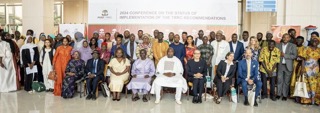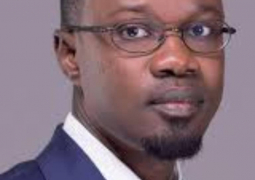
Hon. Minister for Justice Dawda A. Jallow stated that the government of The Gambia remains fully committed to ensuring that the TRRC recommendations were not just words on pages, but a living framework that transforms the society by setting a strong precedent that impunity would have no place in the society.
Justice Minister Jallow further stated that the government remains resolute in its commitment to implementing all the TRRC recommendations, including institutional reforms designed to strengthen governance, uphold human rights, and prevent future abuses.
“Together, we continue to strive for a new Gambia; one rooted in accountability, justice, and respect for human rights and the rule of law. Our efforts are not driven by the desire for applause, but because justice demands it, history requires it, and our shared humanity compels it,” the Justice Minister pointed out.
Dr. Mamadou Tangara, the minister for Foreign Affairs said the conference was dedicated to gauging the progress they have made in the implementation journey throughout the year. “With a five-year mandate to ensure that all 263 recommendations approved by the government are realised, we must work diligently and swiftly, for time is of the essence,” Minister Tangara said.
He added that the TRRC served as a crucial stepping stone, but it was the implementation phase that would ultimately determine whether their efforts were celebrated as a triumph or remembered as a failure. We owe it to the victims of human rights violations to see this process through.”
Our achievements in transitional justice, Dr Tangara said, have garnered recognition, with the truth-finding mission hailed as a success and an exemplary model by the United Nations.
He added that many nations seeking to undertake their own reparation processes were looking to The Gambia's approach as a source of inspiration.
Sirra Ndow, president of the Alliance of Victim Led Organisations, pointed out that the stories of victims reminded them the essence of embarking on this journey designed to restore dignity, ensure accountability, and prevent the repetition of past atrocities.
She said that from 2021 to February 2024, The Gambia government had been giving medical support to the victims before the operationalisation of the victims' commission to specifically meet the need of tortured victims who could not pay medical bills, adding that the Victims' Medical Board was set up by the government and D10M was given to them (Victims' Medical Board.)
Karl Frederik, the United Nations Resident Coordinator, said The Gambia was emerging as a regional leader in accountability and human rights, making significant strides toward achieving Sustainable Development Goal (SDG) 16, which promotes peace, justice, and strong institutions.
Karl added that the Truth, Reconciliation, and Reparations Commission (TRRC) has been central to that progress, focusing on truth, justice, and reconciliation.
The UN resident coordinator urged the Gambian government to fully implement the TRRC recommendations and keep victims at the heart of the transitional justice process to ensure inclusivity and lasting peace.





